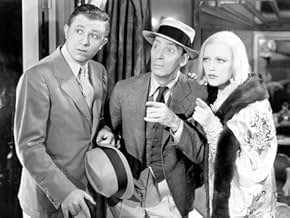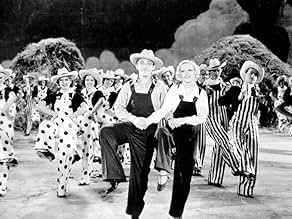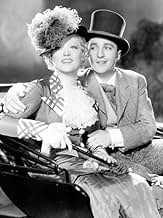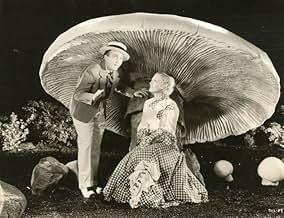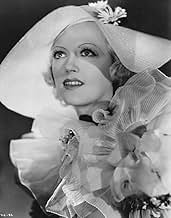A love-struck teacher pursues a radio singer to Hollywood.A love-struck teacher pursues a radio singer to Hollywood.A love-struck teacher pursues a radio singer to Hollywood.
- Director
- Writers
- Stars
- Awards
- 3 wins & 1 nomination total
The Radio Rogues
- The Radio Rogues
- (as Three Radio Rogues)
Sam Appel
- Mexican Bartender
- (uncredited)
Henry Armetta
- Henry Armetta
- (archive footage)
- (uncredited)
Eddie Bartell
- Member - Three Radio Rogues
- (uncredited)
Wallace Beery
- Wallace Beery - Premiere Clip
- (archive footage)
- (uncredited)
Clara Blandick
- Miss Perkins - Divinity Teacher
- (uncredited)
Harry Bowen
- Bartender
- (uncredited)
Nora Cecil
- Briarcroft's Teacher
- (uncredited)
Onest Conley
- Tap Dancer
- (uncredited)
Ken Darby
- Member - The King's Men
- (uncredited)
Jon Dodson
- Member - The King's Men
- (uncredited)
- Director
- Writers
- All cast & crew
- Production, box office & more at IMDbPro
Featured reviews
One of the other reviewers said that this film was essentially about stalking. I had never thought of it in those terms, but it's true.
Marion Davies is a love starved French teacher at a girl's boarding school who's spare hours are taken up with the radio crooning of Bing Crosby. She follows the object of her affection out to Hollywood and in Hollywood cliché style gets her big break in the movies.
First if you're willing to accept the beautiful Marion Davies with this crowd of old spinsters at the boarding school then the rest of the plot simply follows. Second for Bing Crosby fans one has to remember that this is NOT a Crosby picture. He's the leading man in a Marion Davies film. Everyone is familiar with William Randolph Hearst and the Svengali like influence he had on her career. Marion's making a musical so you go out and buy the hottest singer currently as her leading man. And that, boys and girls, is the story of Bing's first film away from Paramount.
You also hire a topflight director in Raoul Walsh to keep things at a brisk pace. And you give Marion a good supporting cast that includes Fifi D'Orsay, Ned Sparks, Stu Erwin, and Patsy Kelly. Mix 'em together and you got Going Hollywood.
It's not a bad mix. Crosby had a lot of songs in this film. The big hit was Temptation, but there were other good ones from Nacio Herb Brown and Arthur Freed. One thing however, since this was not Paramount and MGM was known for the great production numbers in their films, Bing got some great numbers. I'm surprised frankly that Hearst allowed Crosby a huge number like the title tune, set in Grand Central Station, without Davies in it. Davies does join him in a dream sequence where she sings a couple of lines of We'll Make Hay While The Sun Shines with Marion and Bing dressed as a pair of Grand Wood rustics. Another big production number that Paramount would never spend the money for.
Davies had good if limited talents. Hearst however could only see her as a pure heroine. Since he discovered her in the Ziegfeld Follies, Davies's dancing should be no surprise. It's at least as good as Ruby Keeler's. She had a good gift for mimicry, her imitation of Fifi D'Orsay is a key point in the plot. One thing that would be considered in god-awful taste now is her donning black-face to get on Bing's movie set and imitating the dialect.
It's funny though. Think about pictures like Play Misty For Me and The Fan made two generations later. Stalking was looked on entirely differently back in those more innocent days.
Marion Davies is a love starved French teacher at a girl's boarding school who's spare hours are taken up with the radio crooning of Bing Crosby. She follows the object of her affection out to Hollywood and in Hollywood cliché style gets her big break in the movies.
First if you're willing to accept the beautiful Marion Davies with this crowd of old spinsters at the boarding school then the rest of the plot simply follows. Second for Bing Crosby fans one has to remember that this is NOT a Crosby picture. He's the leading man in a Marion Davies film. Everyone is familiar with William Randolph Hearst and the Svengali like influence he had on her career. Marion's making a musical so you go out and buy the hottest singer currently as her leading man. And that, boys and girls, is the story of Bing's first film away from Paramount.
You also hire a topflight director in Raoul Walsh to keep things at a brisk pace. And you give Marion a good supporting cast that includes Fifi D'Orsay, Ned Sparks, Stu Erwin, and Patsy Kelly. Mix 'em together and you got Going Hollywood.
It's not a bad mix. Crosby had a lot of songs in this film. The big hit was Temptation, but there were other good ones from Nacio Herb Brown and Arthur Freed. One thing however, since this was not Paramount and MGM was known for the great production numbers in their films, Bing got some great numbers. I'm surprised frankly that Hearst allowed Crosby a huge number like the title tune, set in Grand Central Station, without Davies in it. Davies does join him in a dream sequence where she sings a couple of lines of We'll Make Hay While The Sun Shines with Marion and Bing dressed as a pair of Grand Wood rustics. Another big production number that Paramount would never spend the money for.
Davies had good if limited talents. Hearst however could only see her as a pure heroine. Since he discovered her in the Ziegfeld Follies, Davies's dancing should be no surprise. It's at least as good as Ruby Keeler's. She had a good gift for mimicry, her imitation of Fifi D'Orsay is a key point in the plot. One thing that would be considered in god-awful taste now is her donning black-face to get on Bing's movie set and imitating the dialect.
It's funny though. Think about pictures like Play Misty For Me and The Fan made two generations later. Stalking was looked on entirely differently back in those more innocent days.
This musical comedy features beautiful Marion as a bored French teacher who runs off to Hollywood. Seems like a standard 30s musical. But wait. The narrative structure of this film is more complex than it at first seems.
At a teachers' meeting at the Briarcroft School, one old maid complains that Davies (she teaches French) is always late because she spends too much time dreaming. They take her some papers to correct and find her.
When Davies turns on the radio and gazes out at the night sky she starts to wish upon a star. Just as she says "I wish I may, I wish I might...." Bing Crosby's voice cuts across the moment as he begins the lyric of "Our Big Love Scene": "Don't waste the night in wishing..." as though in answer to Davies' wish upon a star. She sits up, startled, and packs her bags.
So sets off not to go to Hollywood, but only to find Crosby, who plays a famous radio singer about to embark by train to Hollywood to star in a picture. Crosby is also involved with the picture's French star, played by Fifi D'Orsay. As Crosby is packing up to go, and after a live broadcast of his singing "Beautiful Girl" to Sterling Holloway, Davies finds him. He brushes her off as just another fan and heads to the Grand Central Station, where he sings "Going Hollywood."
On the train, who should show up but Davies. In today's context, Davies is certainly a crazed fan stalking her idol, but in 1933 her actions were (in the context of this film) acceptable. D'Orsay catches the two together (Davies is correcting Crosby's French pronunciation) and immediately suspects them of being up to something. D'Orsay is on the rampage because her maid has quit. Of course Davies becomes her maid, having taught French and all. The second time D'Orsay catches them together, she slaps Davies. Davies quits her job.
Next we find Davies in Hollywood at "Central Casting," asking to see Crosby. She's turned away and meets Patsy Kelly, a film extra. They hit it off right away, and Kelly invites Davies to share her digs. The director (Ned Sparks) walks by and hires them as extras in the film starring Crosby and D'Orsay.
At Kelly's bungalow, Davies takes a nap and has a bizarre dream about herself and Crosby starring in a surreal production number called "We'll Make Hay While the Sun Shines." While Davies dreams, we are shown a huge close up of her face, which is occasionally superimposed over the dream-scene action so that we don't forget it's all a dream. The scene opens with Crosby and Davies in a cozy cottage. Crosby starts the song, and the couple is strolling through a field of giant, swaying daisies and then sitting in a carriage where Davies joins Crosby in a brief duet. They come upon a farm scene of dancing scarecrows . Suddenly Davies emerges from the dancers and takes center stage in a dance lively number. But Crosby and Davies are still sitting in the carriage. Davies points to herself dancing and asks Crosby, "me?" He nods and soon he also is in the dance number. A windstorm suddenly comes up and everyone is drenched by the downpour. Crosby and Davies run back to the cozy cottage where they sit by the fire, wrapped in blankets, while Crosby finishes the song.
On the movie set, Davies once again finds Crosby. He's in between scenes when Davies approaches. She's in blackface and dressed like Aunt Jemima. He doesn't seem to notice that she is not really black. D'Orsay catches them again and slaps Davies for a second time.
Next we're on location and D'Orsay is about to sing her big number, "Cinderella's Fella." The number has a Cinderella theme with the blonde-wigged D'Orsay as the Prince. As she launches into the song, Sparks stops her and tells he she's doing it all wrong because she's doing it as a kooch dance. She throws a fit and storms off the set. Back in her trailer, Crosby tries to comfort her. Meanwhile, back on the set, the Radio Rogues do a series of impressions of current radio stars who include Kate Smith, Morton Downey, and Crosby's singing rival of the day-Russ Columbo.
Davies is then coaxed into doing an impression (Davies was famous for her ability to mimic, and does so in several of her films). Of course she launches into an impression of D'Orsay singing. D'Orsay hears this and marches out to catch Davies in mid-dance and hauls off and slaps her for a third time. This time Davies strikes back and delivers D'Orsay a black eye. D'Orsay quits and Davies is hired to star in the film! Talk about your Hollywood dream!
There is an abbreviated scene, with Davies and Crosby dating, with Crosby singing the wonderful "After Sundown." Later, Davies attempts to deliver some flowers to Crosby, but standing in the hallway outside his door she hears D'Orsay talking to Crosby.
D'Orsay lures Crosby to a Mexican bar and plies him with drinks, knowing he will be fired from the picture after being absent for days. Davies tracks him down yet again and tries to get him back but he's drunk and can't think straight. This sets up the film's best number and another yet dream sequence. Crosby sings "Temptation" while sitting at the bar and drinking what looks like absinthe. As he sings we see huge close-ups of D'Orsay (to match the close-ups of Davies in the previous dream sequence) and cutaway shots of a dance floor crowded with same-sex couples. In the bar itself, no one is dancing. As Crosby approaches the last notes of the song, he lifts his glass and drains the last drops. It's an amazing sequence.
The scene shifts back to the film set where, after seeing a dance montage to "Cinderella's Fella," Davies is about to film an elaborate production number, be-gowned in a massive ermine and sequin outfit. As she is about to begin the scene with Crosby's replacement, Bing can be heard reprising "Our Big Love Scene," and the lovers meet. End of film.
At a teachers' meeting at the Briarcroft School, one old maid complains that Davies (she teaches French) is always late because she spends too much time dreaming. They take her some papers to correct and find her.
When Davies turns on the radio and gazes out at the night sky she starts to wish upon a star. Just as she says "I wish I may, I wish I might...." Bing Crosby's voice cuts across the moment as he begins the lyric of "Our Big Love Scene": "Don't waste the night in wishing..." as though in answer to Davies' wish upon a star. She sits up, startled, and packs her bags.
So sets off not to go to Hollywood, but only to find Crosby, who plays a famous radio singer about to embark by train to Hollywood to star in a picture. Crosby is also involved with the picture's French star, played by Fifi D'Orsay. As Crosby is packing up to go, and after a live broadcast of his singing "Beautiful Girl" to Sterling Holloway, Davies finds him. He brushes her off as just another fan and heads to the Grand Central Station, where he sings "Going Hollywood."
On the train, who should show up but Davies. In today's context, Davies is certainly a crazed fan stalking her idol, but in 1933 her actions were (in the context of this film) acceptable. D'Orsay catches the two together (Davies is correcting Crosby's French pronunciation) and immediately suspects them of being up to something. D'Orsay is on the rampage because her maid has quit. Of course Davies becomes her maid, having taught French and all. The second time D'Orsay catches them together, she slaps Davies. Davies quits her job.
Next we find Davies in Hollywood at "Central Casting," asking to see Crosby. She's turned away and meets Patsy Kelly, a film extra. They hit it off right away, and Kelly invites Davies to share her digs. The director (Ned Sparks) walks by and hires them as extras in the film starring Crosby and D'Orsay.
At Kelly's bungalow, Davies takes a nap and has a bizarre dream about herself and Crosby starring in a surreal production number called "We'll Make Hay While the Sun Shines." While Davies dreams, we are shown a huge close up of her face, which is occasionally superimposed over the dream-scene action so that we don't forget it's all a dream. The scene opens with Crosby and Davies in a cozy cottage. Crosby starts the song, and the couple is strolling through a field of giant, swaying daisies and then sitting in a carriage where Davies joins Crosby in a brief duet. They come upon a farm scene of dancing scarecrows . Suddenly Davies emerges from the dancers and takes center stage in a dance lively number. But Crosby and Davies are still sitting in the carriage. Davies points to herself dancing and asks Crosby, "me?" He nods and soon he also is in the dance number. A windstorm suddenly comes up and everyone is drenched by the downpour. Crosby and Davies run back to the cozy cottage where they sit by the fire, wrapped in blankets, while Crosby finishes the song.
On the movie set, Davies once again finds Crosby. He's in between scenes when Davies approaches. She's in blackface and dressed like Aunt Jemima. He doesn't seem to notice that she is not really black. D'Orsay catches them again and slaps Davies for a second time.
Next we're on location and D'Orsay is about to sing her big number, "Cinderella's Fella." The number has a Cinderella theme with the blonde-wigged D'Orsay as the Prince. As she launches into the song, Sparks stops her and tells he she's doing it all wrong because she's doing it as a kooch dance. She throws a fit and storms off the set. Back in her trailer, Crosby tries to comfort her. Meanwhile, back on the set, the Radio Rogues do a series of impressions of current radio stars who include Kate Smith, Morton Downey, and Crosby's singing rival of the day-Russ Columbo.
Davies is then coaxed into doing an impression (Davies was famous for her ability to mimic, and does so in several of her films). Of course she launches into an impression of D'Orsay singing. D'Orsay hears this and marches out to catch Davies in mid-dance and hauls off and slaps her for a third time. This time Davies strikes back and delivers D'Orsay a black eye. D'Orsay quits and Davies is hired to star in the film! Talk about your Hollywood dream!
There is an abbreviated scene, with Davies and Crosby dating, with Crosby singing the wonderful "After Sundown." Later, Davies attempts to deliver some flowers to Crosby, but standing in the hallway outside his door she hears D'Orsay talking to Crosby.
D'Orsay lures Crosby to a Mexican bar and plies him with drinks, knowing he will be fired from the picture after being absent for days. Davies tracks him down yet again and tries to get him back but he's drunk and can't think straight. This sets up the film's best number and another yet dream sequence. Crosby sings "Temptation" while sitting at the bar and drinking what looks like absinthe. As he sings we see huge close-ups of D'Orsay (to match the close-ups of Davies in the previous dream sequence) and cutaway shots of a dance floor crowded with same-sex couples. In the bar itself, no one is dancing. As Crosby approaches the last notes of the song, he lifts his glass and drains the last drops. It's an amazing sequence.
The scene shifts back to the film set where, after seeing a dance montage to "Cinderella's Fella," Davies is about to film an elaborate production number, be-gowned in a massive ermine and sequin outfit. As she is about to begin the scene with Crosby's replacement, Bing can be heard reprising "Our Big Love Scene," and the lovers meet. End of film.
Sylvia Bruce (Marion Davies) is a bored French teacher but after hearing the melodious sounds of the famous Bill Williams (Bing Crosby) on the radio, she is so inspired she leaves her job and seeks her dream.
Going Hollywood is a rather odd movie as there is the disturbing fact that Marion Davies' character is practically a stalker who insists that their love is meant to be. I can usually accept the fact that it's just a movie - it doesn't have to be realistic, but I just felt her character was a bit of a nut case. I hate to say it but Davies is most unconvincing and it is almost painful to see her scenes. I was disappointed to see this because she was magnificent in silents. That being said, Marion is undoubtedly gorgeous and has a few good moments (and she's not a bad dancer too)... but not nearly enough as there should be.
It is evident that Bing Crosby and the music are the real stars of this picture. He steals every scene from Davies with effortless delivery. The music - especially "Temptation", "Going Hollywood" and "Beautiful Girl" are absolutely delightful little tunes and make the movie well worth watching.
Overall, a bizarre and often tedious movie and Davies isn't at her best. However handsome crooner Bing Crosby and the fantastic music by Arthur Freed and Herb Brown steal the show and make it watchable. Does not compare to the other musicals of this period.
Going Hollywood is a rather odd movie as there is the disturbing fact that Marion Davies' character is practically a stalker who insists that their love is meant to be. I can usually accept the fact that it's just a movie - it doesn't have to be realistic, but I just felt her character was a bit of a nut case. I hate to say it but Davies is most unconvincing and it is almost painful to see her scenes. I was disappointed to see this because she was magnificent in silents. That being said, Marion is undoubtedly gorgeous and has a few good moments (and she's not a bad dancer too)... but not nearly enough as there should be.
It is evident that Bing Crosby and the music are the real stars of this picture. He steals every scene from Davies with effortless delivery. The music - especially "Temptation", "Going Hollywood" and "Beautiful Girl" are absolutely delightful little tunes and make the movie well worth watching.
Overall, a bizarre and often tedious movie and Davies isn't at her best. However handsome crooner Bing Crosby and the fantastic music by Arthur Freed and Herb Brown steal the show and make it watchable. Does not compare to the other musicals of this period.
I expected a lot of enjoyment from this early MGM musical, directed by the great Raoul Walsh. Instead, it is a trifle that somehow works mainly as a showcase for Bing Crosby and Marion Davies. I found the whole film to be intermittently dull and underwhelming, and the songs and numbers oddly misfire from start to finish.
If you like to see the original crooner of all times and really the King of male singers. Bing was a great actor in this film along with super star Marion Davies, who was like the Marilyn Monroe during her days and even Jean Harlow. Marion Davies was also a long time friend of William Randolph Hearst, the newspaper magnet of California. Bing Crosby sings,"You were Temptation" and he must have charmed all the ladies hearts of those days. Wallace Berry, veteran actor has a brief role in this film and is uncredited along with the great Mae Clarke. This is really what Hollywood films were like in the Golden era of movies. It is a must view film.
Did you know
- TriviaWhen Marion Davies requested Bing Crosby as her leading man for this film, he was under contract to Paramount, where they had him starring in shorts and a series of college themed films with Jack Oakie. The success of this film moved Crosby into starring roles at Paramount with the likes of Carole Lombard and Miriam Hopkins, a definite step upwards.
- Quotes
Bill 'Billy' Williams: [singing] Out where they say, "Let us be gay," I'm going Hollywood. I'll ballyhoo greetings to you, I'm going Hollywood. Hey, while you sleepyheads are in that hay, I'll be dancing - I'm gonna be dancing with a sun-kissed baby. And I'm on my way - here's my beret, I'm going Hollywood!
- ConnectionsEdited into The Big Idea (1934)
- SoundtracksGoing Hollywood
(1933) (uncredited)
Music by Nacio Herb Brown
Lyrics by Arthur Freed
Played during the opening credits
Sung by Bing Crosby at the railroad station
Played as background music twice
Details
- Release date
- Country of origin
- Official site
- Languages
- Also known as
- Paid to Laugh
- Filming locations
- Production companies
- See more company credits at IMDbPro
Box office
- Budget
- $914,000 (estimated)
- Runtime1 hour 18 minutes
- Color
- Aspect ratio
- 1.37 : 1
Contribute to this page
Suggest an edit or add missing content


